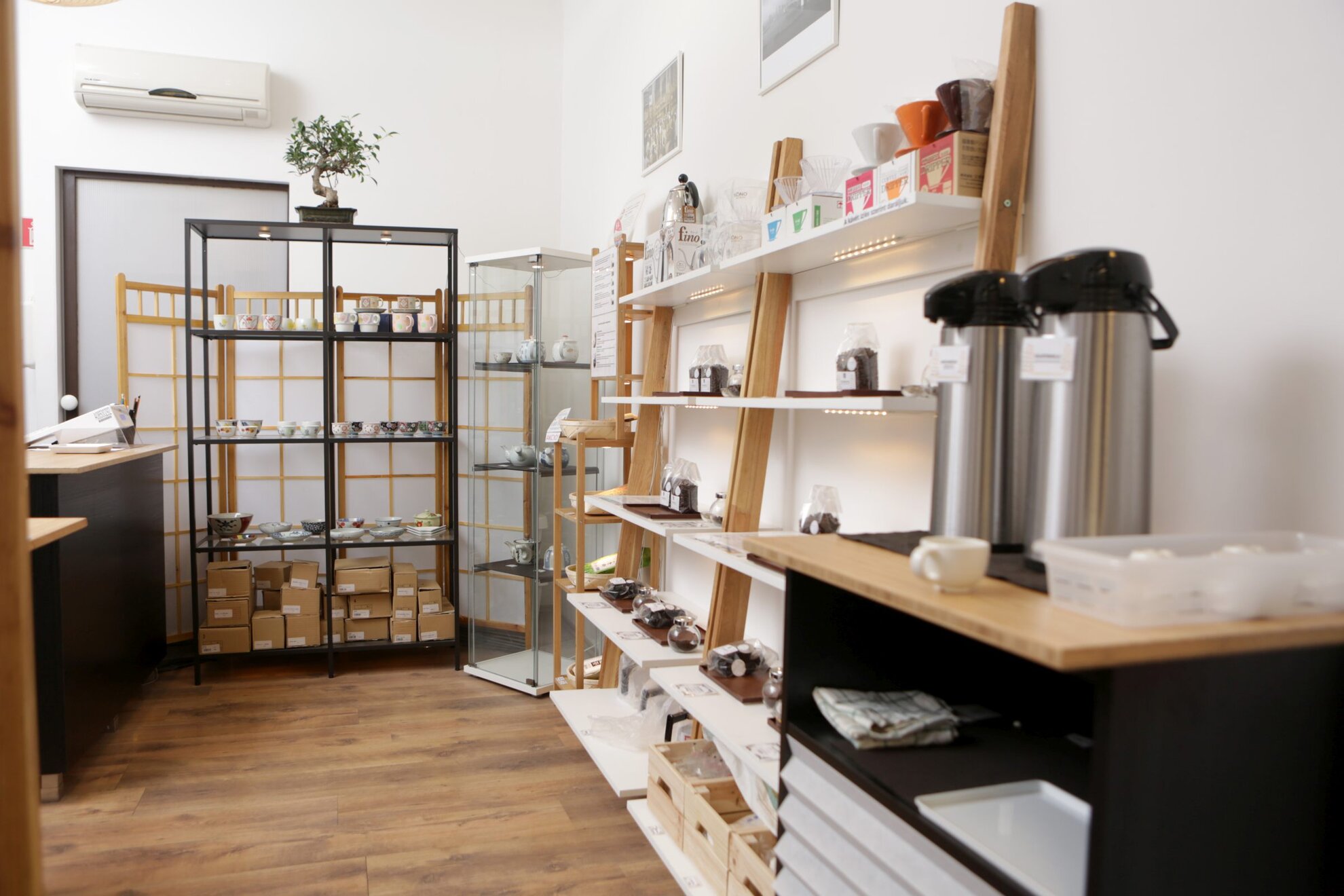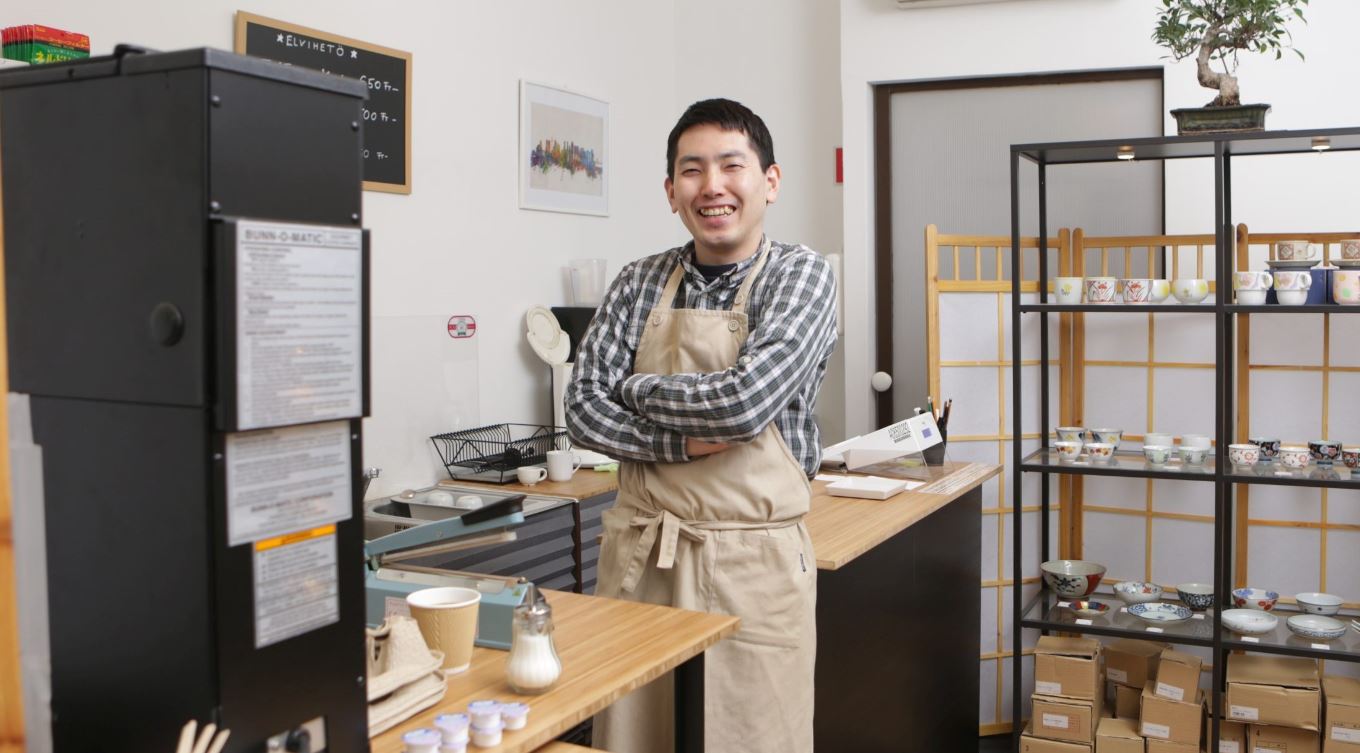According to a 17th-century Japanese folk tale, after Momotaro, a popular hero of Japanese folklore, finds and brings the devil to Japan, he opens a tobacco shop there named Shimaya. The illustrated book of this tale (“Kibyōshi” in Japanese) is the research topic of Andrea Nakazawa, who is a Ph.D. student in ELTE’s Japanese major, but the tale is displayed within the coffee shop’s logo, as well. Andrea graduated with a degree in Japanese social sciences in Tokyo; this is where she met her husband, Yoshihiro Nakazawa, who was working as a coffee roaster as a certified master of the Specialty Coffee Association of Japan. Two years ago, the couple moved to Budapest and fell for the new-wave coffee trend.

Although new-wave cafés are increasingly popular in Japan, they still opt for traditional dark roasting. Naturally, this doesn’t exclude high quality – their dark blend is just as carefully selected and excellent as lighter roasts. In Japan, filter coffees are all the rage, and so espresso machines are somewhat difficult to find. Since it takes longer to prepare the coffee, a personal, intimate atmosphere develops between master (not just barista!) and customer at Shimaya Coffee Roastery.

Yoshihiro Nakazawa greets us kindly; he measures, grinds, and pours water into special coffee makers while a small timer beeps at the end of the 40-second steeping. Shimaya isn’t a café; customers cannot sit down, as the filter coffee and green tea are offered for takeaway only. Visitors can also taste two kinds of coffee – an Indonesian and a stronger Guatemalan blend – from the thermoses placed on a small table next to the minimalistic shelves.
This type of thinner, larger beverage reminds us of American coffee, and you might think that this is just one of the common American influences on Japanese culture – but you’d be wrong. Andrea Nakazawa draws our attention to an important difference: while the typical American brew is a thinner and weaker long coffee, Japanese filter coffee is made with a larger quantity of beans, and even though it tastes smoother and sweeter than usual, it actually contains much more caffeine.

Shimaya is undeniably a shop, not a classic coffeehouse: Colombian, Brazilian, Guatemalan, and Indonesian coffee beans (125 grams for 1,400-1,700 HUF) line up on the shelves behind the counter, any of which we can request to be ground to our preferred fineness, whether we like our java made in an espresso machine, a moka pot, or a dripper. Moreover, we can also get the ground coffee to be poured into capsules to use at home. We tried it: the flavor was just as smooth as a filter coffee. The roastery is located in District XI .

The shop also sells green tea purchased directly from Japanese growing areas, which is rather uncommon in Hungary – as a result of a multi-stage sales process, usually only the lowest-rated tea gets imported to Europe; Chinese green tea is more common in Hungary, too. But the Japanese kind has a different processing method and flavors: while the Chinese variety is slightly acidic, Japanese green tea is softer and sweeter. A cup of this special tea for takeaway costs 500 forints (while a cup of coffee costs 650 HUF). According to Andrea, many customers are looking for matcha tea in the shop, which represents the main trajectory of Japanese teas. “Matcha is more of a ceremonial tea, it’s not what ordinary Japanese people drink,” she says, and adds that they sell sencha tea instead, as well as semi-fermented oolong tea and green tea made from the first young, tender tea shoots of the spring season (the earlier the tea is picked in the season, the higher the quality).

Shimaya offers plenty of accessories and tools, as well, and the hand-painted Arita porcelain and ceramic cups and pitchers are imported straight from the South Japanese porcelain-making area.
Asian products are often tailored to European tastes, resulting in something entirely different than the original, all in the name of “specialty”. Shimaya tries to avoid this phenomenon, and thus the experience it offers might feel pretty ordinary – but those looking for authenticity and fans of Japanese culture will surely appreciate the refreshingly everyday vibe!
UPDATE: Closed




